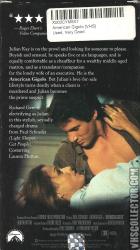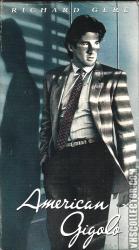American Gigolo
Catalog Number
8989
-
Primary Distributor (If not listed, select "OTHER")
Catalog Number
8989
Primary Distributor (If not listed, select "OTHER")
Release Year
Country
N/A (NTSC)
N/A | N/A | N/A
N/A | N/A
American Gigolo (1980)
Additional Information
Additional Information
His business is pleasure!
He's the highest paid lover in Beverly Hills. He leaves women feeling more alive than they've ever felt before. Except one.
A slick Los Angeles callboy finds love and redemption in Paul Schrader's ultra-stylish drama. High-living prostitute Julian Kay (Richard Gere, stepping in for John Travolta) has it all: the Mercedes, the clothes, access to Beverly Hills' swankiest establishments, and a stable of rich, older female clients. But it all falls apart after he does a favor for his former pimp (Bill Duke) and the trick turns up dead a short while later; Julian's actual client won't give him an alibi, and police detective Sunday (Hector Elizondo) doesn't believe the gigolo's denials. The one person who can help him is frustrated politician's wife (and sole non-paying bedmate) Michelle (Lauren Hutton), if only Julian could let down his defenses and accept her gesture of love. Mixing his admiration for European art cinema with a voyeuristic view of the seamier side of sex and affluence, Schrader renders Julian an inscrutable, emotionally disengaged purveyor of pleasure, decked out in Giorgio Armani clothes coordinated with Ferdinando Scarfiotti's meticulous production design. Amid critical doubts about its artiness and distanced eroticism, American Gigolo surprised everyone by not dying on the box office vine. With some audiences reportedly showing up for repeat viewings of Gere's seductive charms, it became a moderate hit, turning Gere into a star and Armani into the new fashion sensation. Whatever reservations one may have about the movie, it provided two indelible images of 1980s decadence to come: Gere's perusing his "artist's palette" of shirts, ties, and jackets, and Gere's cruising down the Pacific Coast Highway in his convertible to the New Wave strains of Blondie's "Call Me". ~
Christopher Reeve reportedly turned down the part of Julian Kaye despite being offered a million-dollar fee,[3] before Richard Gere became attached to the role. Gere said in 2012 that he was drawn to the role because of its gay subtext. "I read it and I thought, 'This is a character I don't know very well. I don't own a suit. He speaks languages; I don't speak any languages. There's kind of a gay thing that's flirting through it and I didn't know the gay community at all.' I wanted to immerse myself in all of that and I had literally two weeks. So I just dove in."[4]
John Travolta became interested in the part and briefly replaced Gere before getting "cold feet" and dropping out.[5][6] This is not the only role that Travolta has turned down only to be taken by Gere: it had previously happened with Days of Heaven (1978)[7] and occurred again when Travolta was offered the lead in both An Officer and a Gentleman (1982) and Chicago (2002).[8] Gere's very brief nude scenes marked the first time a major Hollywood actor was frontally nude in a film.[9][10] According to Gere, the nudity was not in the original script. "It was just in the natural process of making the movie. I certainly felt vulnerable, but I think it's different for men than women."[4]
Julie Christie was originally cast in the role of Michelle Stratton but her departure was precipitated by Gere's replacement of Travolta.[6] By the time Gere had returned to the project, Lauren Hutton had already been hired. Meryl Streep was also offered the part of Michelle but declined because she didn't like the tone of the film.[11]
Schrader acknowledges that Pickpocket (1959) by the French director Robert Bresson was a direct influence on the film;[12][13] the composition of the final shot draws heavily from the film,[14][15] as does the final dialogue.[16] Schrader later provided an introduction to the Criterion Collection DVD of Pickpocket. Schrader re-visited many of the themes of American Gigolo in his 2007 film, The Walker,[17] and says the idea for that film came about while wondering what would have become of the Julian Kaye character.[18]
The film is widely credited to have established Giorgio Armani in Hollywood, since the Italian designer's clothes are featured prominently
Release Date: February 1, 1980
Distrib: Paramount
Boxoffice: : $22,743,674 2013: $68,061,900
He's the highest paid lover in Beverly Hills. He leaves women feeling more alive than they've ever felt before. Except one.
A slick Los Angeles callboy finds love and redemption in Paul Schrader's ultra-stylish drama. High-living prostitute Julian Kay (Richard Gere, stepping in for John Travolta) has it all: the Mercedes, the clothes, access to Beverly Hills' swankiest establishments, and a stable of rich, older female clients. But it all falls apart after he does a favor for his former pimp (Bill Duke) and the trick turns up dead a short while later; Julian's actual client won't give him an alibi, and police detective Sunday (Hector Elizondo) doesn't believe the gigolo's denials. The one person who can help him is frustrated politician's wife (and sole non-paying bedmate) Michelle (Lauren Hutton), if only Julian could let down his defenses and accept her gesture of love. Mixing his admiration for European art cinema with a voyeuristic view of the seamier side of sex and affluence, Schrader renders Julian an inscrutable, emotionally disengaged purveyor of pleasure, decked out in Giorgio Armani clothes coordinated with Ferdinando Scarfiotti's meticulous production design. Amid critical doubts about its artiness and distanced eroticism, American Gigolo surprised everyone by not dying on the box office vine. With some audiences reportedly showing up for repeat viewings of Gere's seductive charms, it became a moderate hit, turning Gere into a star and Armani into the new fashion sensation. Whatever reservations one may have about the movie, it provided two indelible images of 1980s decadence to come: Gere's perusing his "artist's palette" of shirts, ties, and jackets, and Gere's cruising down the Pacific Coast Highway in his convertible to the New Wave strains of Blondie's "Call Me". ~
Christopher Reeve reportedly turned down the part of Julian Kaye despite being offered a million-dollar fee,[3] before Richard Gere became attached to the role. Gere said in 2012 that he was drawn to the role because of its gay subtext. "I read it and I thought, 'This is a character I don't know very well. I don't own a suit. He speaks languages; I don't speak any languages. There's kind of a gay thing that's flirting through it and I didn't know the gay community at all.' I wanted to immerse myself in all of that and I had literally two weeks. So I just dove in."[4]
John Travolta became interested in the part and briefly replaced Gere before getting "cold feet" and dropping out.[5][6] This is not the only role that Travolta has turned down only to be taken by Gere: it had previously happened with Days of Heaven (1978)[7] and occurred again when Travolta was offered the lead in both An Officer and a Gentleman (1982) and Chicago (2002).[8] Gere's very brief nude scenes marked the first time a major Hollywood actor was frontally nude in a film.[9][10] According to Gere, the nudity was not in the original script. "It was just in the natural process of making the movie. I certainly felt vulnerable, but I think it's different for men than women."[4]
Julie Christie was originally cast in the role of Michelle Stratton but her departure was precipitated by Gere's replacement of Travolta.[6] By the time Gere had returned to the project, Lauren Hutton had already been hired. Meryl Streep was also offered the part of Michelle but declined because she didn't like the tone of the film.[11]
Schrader acknowledges that Pickpocket (1959) by the French director Robert Bresson was a direct influence on the film;[12][13] the composition of the final shot draws heavily from the film,[14][15] as does the final dialogue.[16] Schrader later provided an introduction to the Criterion Collection DVD of Pickpocket. Schrader re-visited many of the themes of American Gigolo in his 2007 film, The Walker,[17] and says the idea for that film came about while wondering what would have become of the Julian Kaye character.[18]
The film is widely credited to have established Giorgio Armani in Hollywood, since the Italian designer's clothes are featured prominently
Release Date: February 1, 1980
Distrib: Paramount
Boxoffice: : $22,743,674 2013: $68,061,900
Related Releases2
Catalog Number
8989
Primary Distributor (If not listed, select "OTHER")
American Gigolo (1980)
Release Year
Catalog Number
8989
Primary Distributor (If not listed, select "OTHER")
Catalog Number
8989
Catalog Number
8989
Primary Distributor (If not listed, select "OTHER")
American Gigolo (1980)
Release Year
Catalog Number
8989
Primary Distributor (If not listed, select "OTHER")
Catalog Number
8989












Comments0
Login / Register to post comments